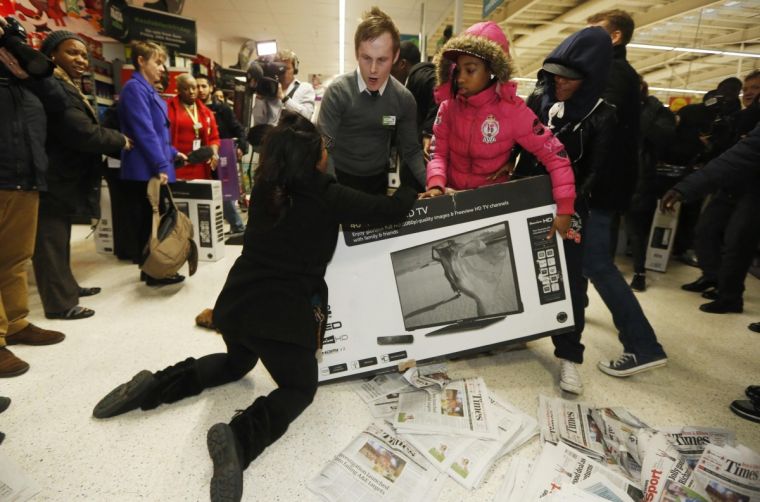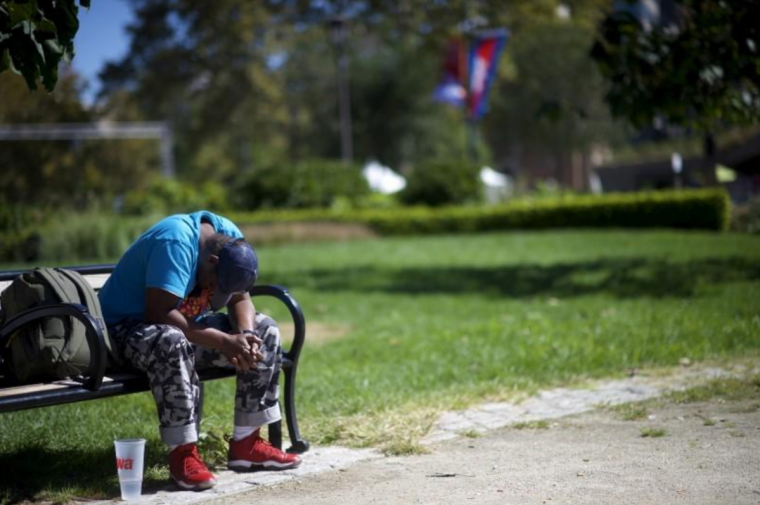Fighting Black Friday: A Christian alternative to consumerism?
If Lent is the season of ascetic refrain from self-indulgence and our consumerist desires, then Black Friday week must be its secular opposite.
Who even knew it had a week now? Most people are aware of Black Friday, a time of supposedly incredible sales and reductions urging shoppers across America (and now the UK too) to splash their cash and get all that stuff they never knew they needed.
Black Friday, and the week of sales that now runs up to it, really is the modern folk festival for a secular age. And perhaps a Christian hang-wringing about the whole occasion is a little too predictable and holier-than-thou. After all, what human being doesn't love a good deal – and when times are hard financially the thought of saving money (particularly on Christmas presents) and getting some nice new things surely isn't wholly tragic and depraved.

Then again, as is often the case with sales, people ironically end up spending more than they would have without a sale, and fill their lives with things they didn't need and will soon replace or throw out. So it's perhaps not a particularly healthy time of year, especially when the feast that traditionally precedes it – Thursday's Thanksgiving – is all about gratitude for what we're given, not the manic accumulation of 'more'.
Apart from austere condemnation, can the Church model something better and more life-giving? The practice of gratitude is of course an important start, a posture central to a humble, Christian life. But what about a further possibility, though not a new one: to not just save or spend our money on ourselves but to give it away? Yes it might sound cliché as a lesson that's been preached from Zacchaeus to Ebenezer Scrooge, but it's still an important challenge. It means not just refraining from indulgence, but learning to give up that which we think makes us safe and happy – and serve others with what we were given. In doing so, we can find a new sense of happiness and peace. As Jesus said: 'It is more blessed to give than receive' (Acts 20:35).
One Christian business innovation that smartly straddles both business and altruism is the Jollie's socks business, the brainchild of entrepreneur Ed Vickers, who's crafted a colourful way to help the homeless. For every pair of socks brought from Jollies, a pair is given to a local homeless shelter, answering a basic need for those with little, but one often missed. Vickers' now acclaimed enterprise has since expanded to include an apprenticeship scheme providing work, retraining and the rebuilding of lives for those who are homeless.
A recent report produced by the homeless charity Shelter suggested that there are as many as 250,000 people living on the streets each night in the UK, and in a separate study that number has been predicted to more than double to 575,000 by 2041 if nothing is done to tackle the underlying issues.
A perfect Christmas gift, supporting the work of Jollie's gets finely crafted sockwear for you or a friend, and supports the homeless in a profound way.
There are many other ways to serve the homeless, who suffer most acutely at Christmas – a time not of warmth and community but often of punishing conditions and loneliness. The Church of England's social action arm, the Church Urban Fund (CUF) has been inviting participation in its annual Advent Sleepout Challenge, in which participants seek sponsors for a night slept outdoors, with proceeds given to CUF's Together programme, supporting night shelters in Manchester, Birmingham, Norfolk, and Mansfield. In Manchester alone, there will be more than 2,100 bed spaces provided in night shelters across 9 churches and supported by nearly 19,000 volunteering hours.

'The work of churches to support people experiencing homelessness and destitution is Christian ministry at its most profound. Whether this is through a Together programme supported night shelter or an Advent Sleepout Challenge, this work is at the very heart of the Gospel,' said Canon Paul Hackwood, CUF's executive director.
The Advent challenge, and many others like it, offer a particularly experiential, and communal way to not only identify with the homeless but to give up comfort so that they can receive it instead.
The needs of the world are clearly immense, as the endless number of humanitarian organisations and charities doing essential aid work witness to. But while global aid efforts can attract the most attention, it's important not to miss those right on our doorstep, addressing the needs of our very neighbours, people we can actually meet, know and love.
'What we invest in love remains, the rest vanishes', said Pope Francis on Sunday, imploring the Christian love of the poor over greedy self-love and storing up of earthly treasures. Whether it's with our time, money or relationships, anyone has the capacity to serve another, to show compassion, making a sacrifice to that another can receive. In contrast, the desperate accumulation of the Black Friday just seems a little empty, if not unjust.
When it comes to those who suffer and need our help, 'God will not ask us if we felt righteous indignation,' the Pope said, 'but whether we did some good.'
You can follow @JosephHartropp on Twitter











